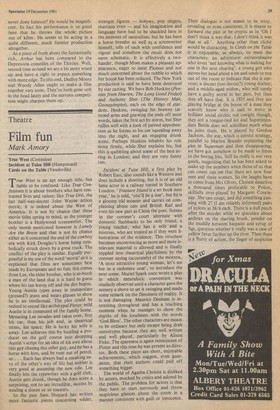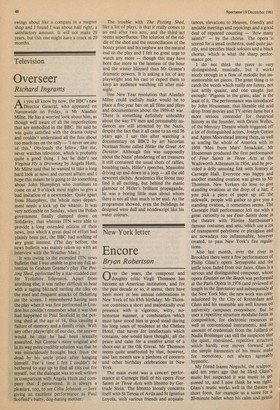Film fun
Mark Amory
True West (Cottesloe) Incident at Tulse Hill (Hampstead) Cards on the Table (Vaudeville) rr rue West is an apt enough title, but liable to be confused. Like True Confessions it is about brothers who have contrasted lives and values; like True Grit, the last half-way-decent John Wayne action movie, it is indeed about the West of America. It is not by chance that these movie titles spring to mind, as the younger brother is a Hollywood screenwriter. The only movie mentioned however is Lonely Are the Brave and that is not by chance either as it concerned the end of the cowboy era with Kirk Douglas's horse being symbolically struck down by a great truck. The conflict of the play is similar. Equally purposeful is my use of the word 'movie' as it is explained that films are sometimes best made by Europeans and no fun; this comes from Lee, the elder brother, who is so much a man of the land that it is hard to guess where his tan leaves off and the dirt begins. Young Austin types away in immaculate (pressed?) jeans and wears glasses to show he is an intellectual. The plot could be recited to sound like archetypal Pinter: mild Austin is in command of the family home. Menacing Lee invades and takes over, first his car, then his job and, in theatrical terms, his space. He is lucky his wife is away. Lee achieves this by hustling a producer on the golf course into dropping Austin's script for an idea of his own about this guy chasing this other guy, and he has a horse with him, and he runs out of petrol, so . . . Each has always had a sneaking envy of the other's way of life but neither is very good at assuming the new role. Lee finally hits the typewriter with a golf club, Austin gets drunk, though he does score a surprising, not to say incredible, success by stealing a dozen or so toasters.
In the past Sam Shepard has written more fantastic pieces concerning wilder, stranger figures — hoboes, pop singers, martians even — and his imagination and language have had to be shackled here in the interests of naturalism; but he has been a horse breeder as well as a screenwriter himself, tells of each with confidence and vigour and somehow the result does not seem schematic. It is effectively a two hander, though Mom makes a pleasant appearance, eager to meet Picasso and not much concerned about the rubble to which her house has been reduced. The New York production is said to have been destroyed by star casting. We have Bob Hoskins (Pennies from Heaven, The Long Good Friday) and Anthony Sher (The History Man, Goosepimples), each on the edge of stardom. Hoskins, swinging his brawny tattooed arms and gnawing the ends off most words, takes the first act by storm, but Sher rallies well with a look of pained apprehension as he listens to his car squealing away into the night, and an engaging drunk scene. Perhaps Hoskins inhabits his role more firmly, while Sher explains his, but this is quibbling about some of the best acting in London; and they are very funny too.
Incident at Tulse Hill, a first play by Robert East, also sounds like a Western and does include a shooting, but it is of an old lame actor in a railway tunnel in Southern London. Treasure Island is a set book next year,' he is told, 'you'll be a star', but he is a gloomy old moaner and carries on complaining about cats and British Rail and even his new part as Cinna the poet. Scenes in the coroner's court alternate with domestic flashbacks to his only friend, a young teacher, who has a wife and a mistress, who are treated as if they were illustrations of the evidence. This structure becomes unconvincing as more and more irrelevant material is allowed and is finally toppled into theatrical playfulness by the coroner saying (accurately) of the mistress, 'A most attractive young woman, let's see her in a cashmere coat', to introduce the next scene. Muriel Spark once wrote a play in which naturalistic convention was similarly observed until a character gave the scenery a shove to set it swinging and made some remark on the flimsiness of reality. It is not damaging. Maurice Denham is interesting throughout and has a touching moment when he manages to show the depths of his loneliness with the words 'God Bless'. The other characters are meant to be ordinary but only escape being drab stereotypes because they are well written and well played, particularly by Alison Fiske. The spareness is again reminiscent of Pinter and this time he was present as director. Both these plays are short, enjoyable achievements, which suggest, even guarantee, that their authors could pull off something bigger.
The world of Agatha Christie is disliked by actors, mocked by critics and adored by the public. The problem for actors is that they have to start nervously and throw suspicious glances about the room in a manner consistent with guilt or innocence. Their dialogue is not meant to be witty, revealing or even consistent; it is meant to forward the plot or be cryptic as in 'Oh I don't think it was that. I don't think it was that at all.' Anything other than cliché would be distracting. In Cards on the Table it is enjoyable, as always, to meet the characters: an adventurer extraordina ire who loves 'not knowing what is waiting for one in the next clearing'; a young girl who moves her head about a lot and tends to run out of the room to indicate that she is nervous; a decent (too decent?) young doctor; and a middle-aged widow, who will surely have a guilty secret in her past, but then they all have that. It is 1935 and they are playing bridge at the house of a man they scarcely know who is said to move in brilliant social circles; not tonight though, they are a tongue-tied lot and Superintendent Battle does not scintillate much when he joins them. He is played by Gordon Jackson, the star, which is correct strategy, parallel to Marlon Brando explaining the plot in Superman and then disappearing; we have got somehow to be made to listen to the boring bits. Still he really is not very quick, suggesting that he has been asked to make up the numbers when those of us that can count can see that there are now four men and three women. So the laughs have to come from Mrs Oliver, Christie detective a thousand times preferable to Poirot, skilfully over-played by Margaret Courtenay. She can count, and did something_cunning with 27 (I am reliably informed) pairs of nylons at 38/6 each. There is a dull patch after the murder while we speculate about anthrax on the shaving brush, ponder on the muddle between hatpaint and syrup of figs, question whether it really was a case of yellow fever further up the river. Then there is a flurry of action, the finger of suspicion
swings about like a compass in a magnet shop and I found I was about half right, a satisfactory amount. It will not make 29 years, but this one might have a crack at 29 months.



































































 Previous page
Previous page